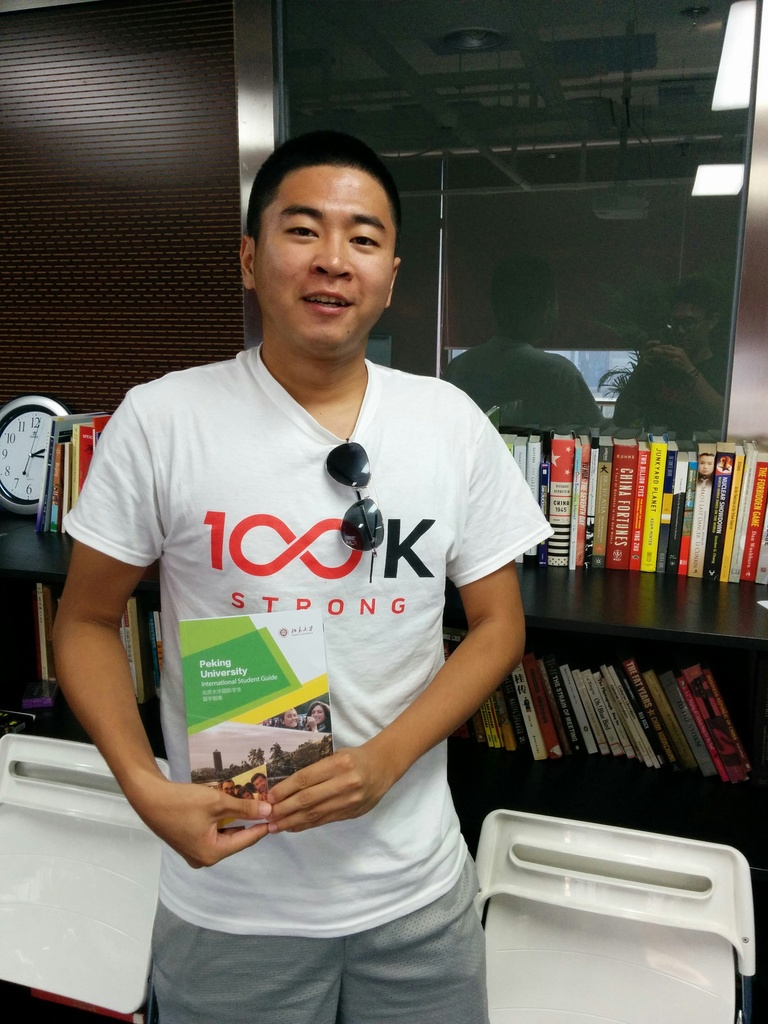Jeffrey Ding is a senior from Iowa City, IA studying political science, economics and Chinese at the University of Iowa. He will be spending this fall in Beijing, China on the CIEE Advanced Chinese Studies program and will continue living there next semester as he pursues an internship funded by a Boren Scholarship.

Jeffrey Ding is spending the fall semester at Peking University through CIEE’s Advanced Chinese Studies program.
On the first day of class, I can’t tell if the teacher is giving an overview of the course or trying to convince people to drop it. Perhaps the culprit of my confusion is my participation in a rigorous study abroad program at Peking University, known as the “Harvard of China”, through which I am directly enrolled in classes with Chinese undergraduate students at the School of Economics and the School of International Studies. For the rest of the three-hour long class on Chinese approaches to foreign affairs, I am frantically looking up words in my Chinese-English dictionary, piecing together meanings of terms through loose-fitting English equivalents, nodding at what I hope to be appropriate times in the instructor’s lecture. By the end of the Chinese diplomacy class, I am considering dropping the course.
Yeah, so studying abroad is hard. Beijing’s persistent smog has not been kind to my lungs. There’s a multiplicitive uncertainty in making new friends and participating in the classroom when you initially comprehend 80 percent of what has been said and you can probably only communicate back 70 percent of your original meaning. Before even registering for my courses, I barely passed a language proficiency exam. The term the test administrator used when describing my test result was bianyuan, meaning “borderline”.
At the University of Iowa, I’ve been fortunate to befriend many international students and learn about their struggles adjusting to campus. Now, registered as an international student at Peking University, I’ve realized empathy is a powerful yet incomplete substitute the actual experience of studying abroad in a foreign land.
My second class, Ecological Economics, is also difficult. But the professor’s enthusiasm for the subject material overwhelms any other feelings. I jumped at the opportunity to discover more about ecological economics – distinct from neoclassical economics in that the former view the human economy as embedded in the overall environment rather than the environment as a subset of the human economy. The field is especially exciting in China. In Mark Clifford’s The Greening of Asia, the vastness of China means it will significantly influence how humanity deals with the limits of the planet’s carrying capacity: China is the world’s largest emitter of greenhouse gases, projected to be home to 7 of the world’s 13 megacities in 2025, and the world’s largest manufacturer and market for wind and solar power equipment. The professor says more than once how genuinely happy she is that so many students are interested in this relatively new, interdisciplinary subject. The word she uses to express happiness is xingfu. The first character xing means fortunate; the second character fu means blessing.
I feel truly fortunate and blessed to be studying abroad this semester. With the help of scholarships from the university and the federal government, I get the chance to develop my language skills and cultivate my academic interests with a Chinese perspective. Happiness, like ecological economics, and also language learning for that matter, takes a system-level view. Happiness in Beijing is street food runs at midnight, pre-dawn hikes up the Great Wall, and afternoon pick-up soccer.
The PowerPoint presentation in my third class is completely in English. As the professor is going through the evolution of incentive theory and its applications in economic development, he constantly references American contributions and praises the work of American scholars. In fact, in all my classes, the United States serves as the first comparison point whenever a topic is discussed at the global scale. In contrast, on the first day of orientation for my study abroad program, twenty American students (including myself) could not name the previous two Chinese presidents, Jiang Zemin and Hu Jintao. This is the equivalent of not knowing the George W. Bush and Bill Clinton of China.

A quiet and beautiful climb up the Great Wall at Jinshanling.
China’s fascination with the United States reminds me of the “Fifth Chinese Rule” in a book I’ve been reading called Chinese Rules by Tim Clissold. Borrowing from Sun Tzu, it states: Know yourself and know the other and you’ll survive a hundred battles. Setting aside the antagonism implicit in the quote, the core plea to understand other countries – especially one that may soon have the largest world economy – still stands. As a student ambassador with 100K Strong, I hope to promote more Mandarin learning and study abroad in China. In the section on the fifth Chinese rule, Clissold argues, “The British controlled the seas in the 19t century and America controlled the air in the 20th; the outcome of the next century may be determined by whoever most influences the emerging global “culture,” including international standards and norms. That will be a battle of soft power, of economics and other nonmilitary means.
If the United States wants to survive this century’s hundred battles of soft power, it will need to invest in learning about China. I think I’m going to take that first class after all.